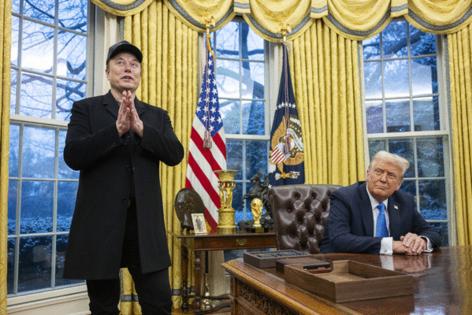Musk departs DOGE, leaving cost-cutting effort's legacy in question
Published in News & Features
WASHINGTON — Billionaire Elon Musk said Wednesday that his time as formal adviser to President Donald Trump is coming to a close, raising questions about the future of the Department of Government Efficiency effort he spearheaded.
“As my scheduled time as a Special Government Employee comes to an end, I would like to thank President @realDonaldTrump for the opportunity to reduce wasteful spending,” Musk posted on X, his social media platform. “The @DOGE mission will only strengthen over time as it becomes a way of life throughout the government.”
By law, Musk’s status as a temporary government official was set to run out as soon as May 30, although the exact date was subject to an accounting of his actual days worked. A White House official familiar with the move, speaking on condition of anonymity to discuss a personnel matter, said Musk began the off-boarding process Wednesday night and cast the departure as a decision the technology entrepreneur made on his own with the support of the president.
The move comes shortly after Musk gave an interview critical of Trump’s biggest legislative priority — the tax cut proposal known as the “One Big Beautiful Bill” — as not doing enough to reduce federal deficits.
Musk’s campaign to slash the size of the U.S. government sent shockwaves through Washington, with some agencies eliminated outright and tens of thousands of federal workers purged or persuaded to accept buyouts, but the initiative fell short of its own high expectations for cost savings.
Trump originally gave the effort a sunset date of July 4, 2026, allowing DOGE nearly 18 months to find what Musk originally promised would be $2 trillion in savings. Musk later downgraded that ambition to $1 trillion — and then even further to $150 billion.
Musk, 53, has joked that his White House title was “chief nothing officer” and maintained he was not essential to the mission. But he quickly became a lightning rod for critics of the venture who focused on the optics of the world’s richest man working to help dismantle the government’s workforce and functions.
Trump and Musk have previously declined to lay out a succession plan for DOGE. The project was Musk’s brainchild — even down to the acronym that paid homage to an internet-famous dog meme that’s long been an object of his obsession.
“DOGE is a way of life, like Buddhism,” he joked during one briefing, suggesting that the effort would proceed even after his exit. “Buddha isn’t alive anymore. You wouldn’t ask the question: ‘Who would lead Buddhism?’”
The three top lieutenants he brought to that interview — Steve Davis, Antonio Gracias and Anthony Armstrong — have taken up key DOGE outposts at the General Services Administration, Social Security Administration and the Office of Personnel Management. Those agencies have been among the most active in implementing DOGE’s anti-fraud, cost-cutting mission.
DOGE’s work has drawn lawsuits over its authority and access to government data and some claims about cost savings have been inaccurate, sparking questions about accountability at the endeavor. Musk has also faced questions regarding conflicts of interest for a tech entrepreneur whose varied business interests already make him a major player in federal contracts.
The backlash against Musk over his high-profile political work sparked concerns among investors over the fallout for his companies, most prominently Tesla Inc. Vehicle sales fell to a nearly three-year low in the first quarter of the year and the stock price plummeted, leading many Wall Street analysts to slash growth expectations.
Tesla cars, showrooms and charger stations endured protests and acts of vandalism, with the Cybertruck being a particular target for critics of Musk. Trump and allies have rallied around the CEO, including an event on the White House grounds where the president viewed different Tesla models before settling on buying a a red Model S, in many ways an unprecedented spectacle.
Musk has openly acknowledged the challenges of managing his businesses along with his work in Washington. The Tesla CEO told investors in April that he would soon devote “far more” of his time to the automaker and that his work for the government was “mostly done.” He also oversees four other companies: SpaceX, XAI Holdings, Neuralink and The Boring Co.
©2025 Bloomberg L.P. Visit bloomberg.com. Distributed by Tribune Content Agency, LLC.







Comments